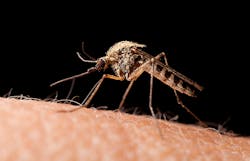We anticipated that Zika-carrying mosquitoes eventually would appear in the United States at some point this summer, but hoped they wouldn’t. but in late July, officials in Florida announced four cases of locally transmitted Zika virus in the Miami area.
Prior to this development, the biggest concern for Americans was contracting Zika if they traveled to the Caribbean or South America. Before the Florida cases were announced, Americans generally could acquire the virus only if they visited these areas or had sexual relations with a traveler who was bitten by a mosquito while visiting a country in the Southern Hemisphere.
Now Americans should have a different concern. The cases in Florida show us that mosquitoes in the United States are carrying the virus. The concern for us now broadened to include the fear of acquiring Zika directly from a mosquito bite.
There is good reason for this concern. While Zika generally exhibits only mild symptoms in healthy adults, it can have devastating consequences, including severe birth defects, for an unborn child if contracted by the mother just before or during pregnancy. There is also no available treatment or vaccine for the virus.
Tips for Employers
In light of last week’s development, employers should take precautions to protect their employees from mosquito bites. Employers located in the southeastern United States, where the Zika-carrying aedes aegypti mosquito is most commonly found –especially Florida, Georgia, South Carolina, Mississippi, North Carolina, Texas, Louisiana and Alabama – should be on heightened alert. A recent article found highlighting geographical location of Zika forecasted the likelihood of Zika-carrying mosquitoes appearing in the United States, and predicted that they would most likely be found in those states.
It’s unclear at this point if potential exposure to mosquitoes carrying Zika will trigger regulations from OSHA or establish a legal duty on behalf of employers. That should not be, however, the present concern of employers. Rather, they should focus on keeping employees safe now.
Here are some tips for preventing mosquito bites in the workplace:
- Educate Your employees. A great safety program starts with education. If employees understand the risks associated with Zika, they more likely will comply with work rules regarding their safety. The Centers for Disease Control and Prevention provides great resources to assist you with the education process.
- Provide mosquito repellant. Obviously, employees working outside are at greatest risk of mosquito bites. Purchase mosquito repellant for your employees and ask that they wear it while working outside. Retain a pest control company to spray mosquito repellant on your company’s property. Instruct employees on how to spray repellant on their clothing (e.g., make sure it is sprayed on the outside of clothing, not under it (mosquitoes can bite through thin clothing)), and to use soap and water to remove repellant after work. Encourage employees to not wear strong cologne or perfume when working outside.
- Remove all stagnant water from outside your facility. If possible, remove all containers that may accumulate water from your work site. Mosquitoes tend to congregate near standing water.
- Provide proper clothing for your employees. Public health officials recommend that light-colored, long-sleeve shirts and pants be worn when working in areas where mosquitoes are present. If the presence of mosquitoes poses a safety threat to your employees, OSHA may require such clothing under its personal protective equipment (PPE) regulations.
- Perform work inside. If possible, relocate employees who generally perform work outside to an indoor location.
- Adjust work schedules to avoid dawn and dusk hours. Mosquitoes are most active during these times. If possible, adjust the hours of employees working outside accordingly.
- Document your actions. As with any other safety measure, memorialize the precautions you take in writing. This will prove beneficial when defending any potential future claim relating to safety concerns in the workplace.
Taking these steps can go a long way towards preventing mosquito bites and eliminating the threat of your employees contracting the Zika virus.

